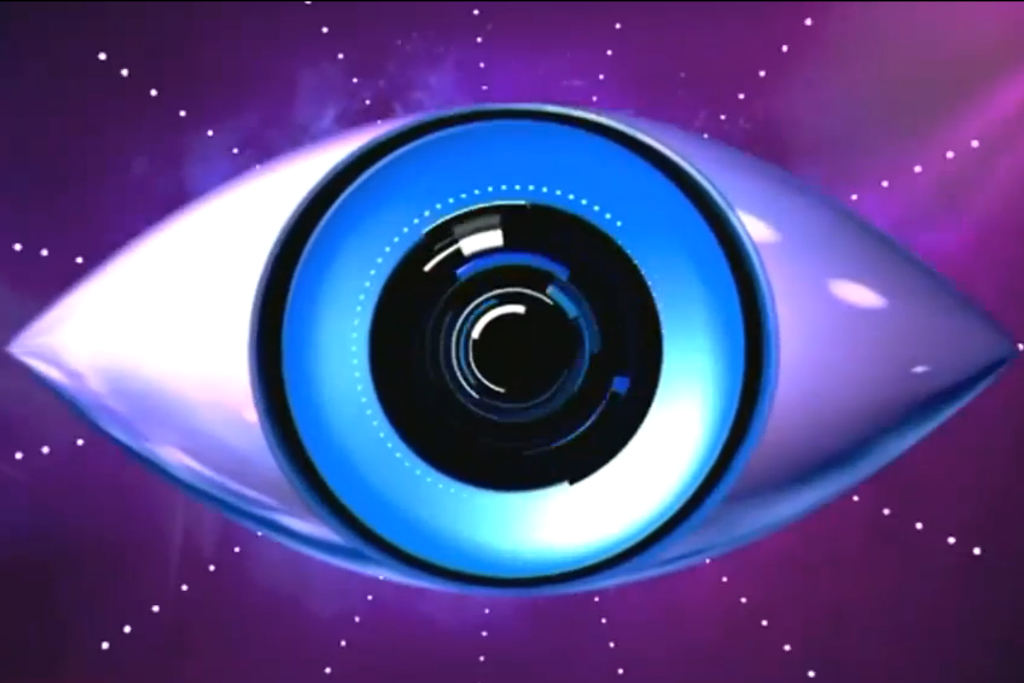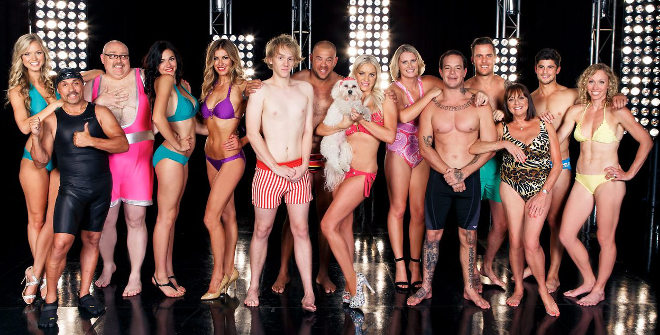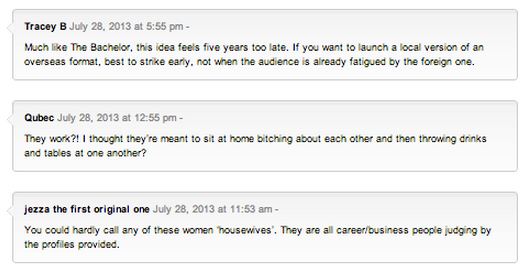The Real House-Fails Of Homegrown Reality TV
Why do Australia's attempts to emulate US reality shows so often fall so short of the mark?

What is it about Australia’s attempt at US reality TV shows that so often falls short of the mark? As a culture, we have so many things in common with our American counterparts: good weather, blonde hair, insecurity. Plus we’re so cashed up these days — thanks, La Rinehart — that we have an enormous pool of nouveau riche to draw on, the staple of any reality empire (I see you, Kim K).
Last week, the cast of The Real Housewives Of Melbourne was announced, and the familiar pangs of embarrassment were felt around the country. But it’s not that we don’t like reality TV: last Sunday’s return of Big Brother rated respectably, and Twitter was abuzz with commentary (‘I love X’, ‘I hate Y’, ‘I’m watching this year’, etc).
If you look closely at Australia’s recent history with the format, it seems that the reality shows that enforce the laconic, unaffected way we like to view ourselves continue to prosper, whereas anything that alludes to prestige, excess, or fame reveals deep insecurites. Is it perhaps that, as a nation, we don’t think we deserve fame?
Maybe We Just Don’t Want it Enough?
We’ve done the rich, white women thing before. In 2012, Lara Bingle and Brynn Edelsten hit the reality fame game, with shows that were just as vacuous as any of the human botox dumpsters that power the E! and Bravo networks.

Bingle — famous for wondering where you are, then wondering what her boyfriend’s camera was doing, then wondering what that pesky brake pedal is for (“it sah gets in the way of my cantilever heel, babes”) — crashed and burned in her expensive Channel Ten reality series, Being Lara Bingle. Edelsten was an American import with saran-wrapped skin and OTT fashion who married old and rich on Channel Seven’s My Bedazzled Life. It didn’t turn out well.
If Bingle & Brynn were our “supplicant” Kim Kardashian and Anna Nicole Smith, and their attempts failed, what does this say about our desire to worship American reality icons and reject our own?
Ironically, the problem may come down to a lack of shamelessness. American reality stars like Kim Kardashian and many Housewives have built multi-million dollar empires by exposing and scripting their augmented realities (and faces), and parlaying that into mega-fame. That takes a specific combination of blind confidence and ruthless hunger. In the land of the free and the brave, every kid seems to grow up thinking that the path to fame is their God-given right. Here in the land of “fuck off we’re full”, it’s seen as rather gauche to desire fame (another sure fire ways to alienate middle Australia: use the word “gauche”). Cultural cringe gets thrown about so often as a shorthand for Australia’s insecurities, but in the instance of reality TV, it’s not far off the mark.

Celebrity Splash was dumped from Seven’s prime time slot a week after its debut, before being canned early. No one was particularly surprised.
In the last eighteen months, Bingle and Brynne, along with Celebrity Splash, Excess Baggage, and I Will Survive, were all dismal failures. Series were bumped to secondary channels and/or had their seasons shortened. Who green-lit these re-hashed American concepts without first asking, ‘Will this be something we’re interested in?’
You know the old saying, ‘When you assume, you make an ass out of you and me?’ Well, come meet the asses:
Blame The Suits!
TV Executives are well known in the industry for their lack of imagination. What motivates these programming decisions is often fear. TV is under threat, with online gaining traction and viewers abandoning any sense of loyalty, and criticism floods Twitter before the credits have rolled. When budgets bloat and profits dwindle, risk-taking gets thrown out the door — and as anyone who ’s worked in the industry will tell you, the second-guessing of executives can strangle creativity like a drunk Housewife strangles her best frenemy.
This shifting marketplace has made for some tricky business decisions. Like album sales, TV ratings will never hit the sweet highs of yesteryear. We have too many other sources of entertainment now to be bound by the restrictions of commercial programming. As a result, there is fierce competition for the remaining audience that’s still loyal to the box: suburban Australia. Ahh the middle classes: too full of bread to storm the Bastille, they (okay fine, we) still take stock in the shared experience of sitting down in front of the “telly”.
Sound stereotypical? That’s because it is. There is no easy way to determine what “middle” Australia wants to watch, because there is no easy way to define what “middle” Australia is. TV executive and advertisers continue to make tired, outdated assumptions, and in doing so sell the creative potential of TV short. When facing an unforgiving board in an era where failure equals the loss of millions of dollars in revenue, you learn to play it safe.
Insiders Tell All
I spoke with someone who’s worked in Australian reality TV for years, jumping from one glorious car crash to another. The job market being what is it, she preferred to stay anonymous, so we’ll just call her Deep Throat. When I asked if she thought Real Housewives Melbourne was going to tank, she said, “For sure, 100%”.
When I asked if she was going to watch it? “For sure, 100%”.
Deep Throat pointed to the fact that the Australian women cast as Real Housewives seemed “too savvy, too concerned with their image” to really let fly with the Pinot-throwing, wig-snatching antics that make the US housewives household names. It may seem strange to present US reality stars as “not being concerned with their image”, but there is a complicit understanding in America that to get to fame, one must sacrifice dignity. It’s almost like dignity has become a personality flaw, a behavioural problem one must overcome to achieve the brash American brand of success: being known.
One enduring reality format that does work in Australia is Big Brother, back again on Channel Nine for another year, after being dropped by TEN in 2008. So why do the housemates endure, while the housewives are pre-judged — and harshly?

The “fly in the ointment on the wall” reality format of Real Housewives et al is about aspirational living. Not the good-natured, “fix-this-house” aspirational living like on The Block, or the “hey-I’m-just-an-everyday-
Big Bros Before Hoes
When Big Brother Australia debuted in 2001, it was like we didn’t even know how badly we wanted it. Sarah-Marie captivated the heart of a nation (THE HEART OF THE NATION) by doing something called the “bum dance”, which bordered dangerously on become this country’s ‘Macarena’. Ben and Blair, the series’ winner and runner-up, confirmed the egalitarian nature of Aussie mateship and, being white straight men with little to no remarkable features, we let them win. We demonised Gay One, muted the Black One, and kicked out Andy, the sex-positive South American immigrant in the first week (STRAYA, FUCK YEAH). This was all in the first season alone.
Perhaps Big Brother was so beloved because it was the Australia “we” all wanted: closed off from immigration (aside from the odd intruder), lazy, predominantly white, and just having a laugh. Moreover, using the powers of phone voting, that year’s mantra of “we will decide who” was welcomed into this microcosm — and we quickly got rid of those that weren’t.
By 2006, the format was getting tired, reaching peak derp over the moral outrage of the late-night Adults Only. The target demographic was six years older now, and the “talent” has become repetitive too. It became harder to convince ourselves that these “real people” weren’t motivated by a desire for fame, as opposed to being magically chosen to appear on our televisions.
That may be a key to the enduring success of Big Brother: much of the audition process is hidden from the viewer. On genuine talent shows, like Idol and The Voice, the auditionee must prove their worth in the first few notes, and endear themselves to the judges and to us; having a story helps, but that’s not all that it’s about. The casting of Big Brother, on the other hand, is a far more strategic, producer-driven process — and the more it feels like these “everyday” Aussies just wandered on in, the more we enjoy the deceit.
Where Is All This Going?
Over the years, diversity on Big Brother has increased. Gay men have won, and proposed to their boyfriends on stage. This year’s cast features greater levels of diversity, with more people of mixed heritage and sexuality. Whether they remain in the house as long as the pretty young straight white people do is, like the country as a whole, in our hands.
The television we make, like all cultural product, needs to be representative of the nation as a whole — it should not just represent the common denominator. Give us only what we want and we’ll become a national of culturally bloated diabetics. The free market may mean that consumers determine what products are necessary, but how anyone can abide a free market that allows this kind of thing is beyond me:
–
Nic Holas mainly fills his time with the creative management of performance, media, and the arts. His writing has appeared in Hello Mr magazine and Cosmopolitan. You can find him on Twitter @longlivecanapes, or living out his fantasy life as a celebrity attache atutauberkoolja.com.